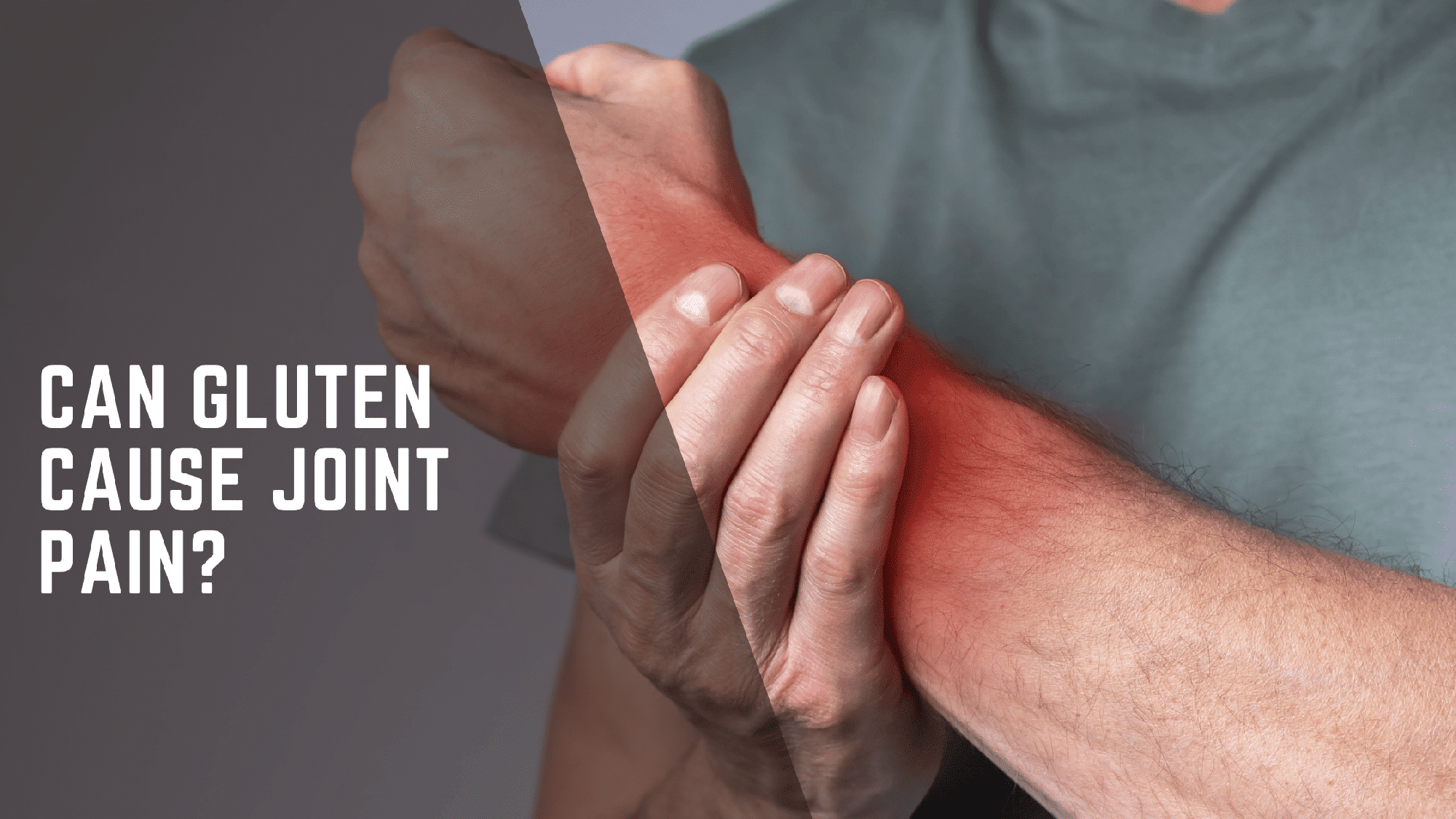Can Gluten Cause Joint Pain? Discover the Truth Now!

Tired of struggling with chronic joint pain and not finding relief? Wondering if gluten could be the cause?
Dive into this blog post to get the answers you’re looking for – we’ll explore the effects of gluten on your body and discuss whether it could be the culprit behind your painful joints.
Don’t have time to read now? In a nutshell, gluten can cause joint pain by increasing inflammation levels in your body, particularly if you have celiac disease or gluten sensitivity.
Read on now to find out more and determine if this could be an issue for you!
The Relationship Between Gluten and Joint Pain
For many people with celiac disease or gluten intolerance, the relationship between gluten and joint pain can be a genuine concern.
While there is not always a clear cause-and-effect between gluten consumption and joint pain, there may be a connection between the two.
It’s important to understand that celiac disease is caused by an autoimmune reaction to the ingestion of gluten, resulting in inflammation and damage within the small intestine.
Unfortunately, its effects can be far-reaching — potentially leading to joint pain and other conditions such as anemia and osteoporosis.
This type of inflammation tends to manifest in many parts of the body due to systemic issues related to both nutrient absorption and vitamin deficiencies.
For those affected by celiac disease or gluten intolerance and joint pain, it is essential to have both conditions adequately diagnosed and managed.
Nutrition is key for those dealing with either condition — along with exercise for muscle strength and maintenance of joint mobility — as this may help mitigate any negative impacts from each condition on its own.
Potential Causes of Joint Pain
Joint pain is common among adults, but the underlying causes aren’t always clear. Injury, age-related conditions, and medical conditions like rheumatoid arthritis are some of the most frequent contributors to joint pain.
Surprisingly, a lack of activity can be just as detrimental – inactivity leads to weakened supporting muscles and can put too much strain on the joints when we decide to become active again.
For those with celiac disease and gluten intolerance, joint pain may be caused by an autoimmune response or nutritional deficiencies.
Here are some of the most common causes of joint pain in those with celiac disease or gluten sensitivity:
- Inflammation: Celiacs often have an overactive immune system that leads to inflammation throughout their body, including in their joints.
- Vitamin Deficiency: Celiacs can suffer from vitamin deficiencies due to their inability to properly absorb nutrients from food. This can lead to joint pain as vitamins like B12 and D help keep bones strong and joints healthy.
- Autoimmune Reactions: Autoimmune reactions are when the body attacks itself instead of fighting off outside invaders like viruses and bacteria. For celiacs, this can increase inflammation which leads to pain and discomfort.
- Nutrient Malabsorption: Celiacs have trouble absorbing nutrients due to the damage done by gluten on the small intestine’s villi–the tiny finger-like projections that line its walls and help absorb nutrients from food into your bloodstream.
How Gluten May Contribute to Joint Pain
It’s no secret that someone with celiac disease or gluten intolerance must stay vigilant about their diet to avoid unintended gluten exposure. But did you know that avoiding even the smallest amount of gluten can help reduce joint pain?
Recent studies have begun to uncover the potential links between gluten and joint pain. It is believed that gluten can cause inflammation and trigger an autoimmune response that can potentially cause joint pain.
For those already dealing with an inflammatory joint disease such as rheumatoid arthritis, knowing that gluten can exacerbate their symptoms is important for managing pain.
The good news is that a gluten-free diet is usually enough to reduce joint pain and improve joint health in those with gluten intolerance or celiac disease.
However, it is important to note that if joint pain persists on a gluten-free diet, other autoimmune diseases may play a role. In these cases, speaking to your doctor is important to determine the best treatment plan.
If you’re suffering from joint pain, the best approach is to take a good look at your diet. Eliminating gluten can be a great place to start.
Speak to your doctor to get more guidance on a gluten-free diet, as well as discuss supplements and other treatments that could help improve joint health and reduce pain.
4 Tips for Treating and Managing Joint Pain
Avoid Gluten at All Costs
The most crucial step when dealing with joint pain from gluten intolerance is to avoid gluten at all costs.
Eliminating gluten from your diet is essential for relieving joint pain and other symptoms associated with gluten sensitivity or celiac disease.
So be sure to avoid all products that contain gluten, including wheat, barley, rye, and anything with “stealth” gluten, like oats (which can be contaminated during manufacturing). Look out for gluten-free specific oats to be on the safe side.
Get Enough Sleep
Getting enough sleep is important for overall well-being and for managing joint pain. Physical stress starts to mount when our bodies do not get enough rest, and our muscles and joints begin to experience pain and inflammation. Therefore, make sure that you are getting enough rest and are going to bed at a reasonable hour.
Exercise Regularly
Exercising regularly is an effective way to reduce joint pain, increase mobility and flexibility, and improve your overall health. A regular exercise routine helps to keep the muscles around the joints strong and flexible while boosting blood circulation and flushing toxins out of the body.
Before beginning any exercise program, however, it is important to consult with a healthcare professional to ensure that it is safe for you.
Take Supplements
Taking nutritional supplements and herbs can also help to reduce joint pain. For example, omega-3 fatty acids can help to reduce inflammation, and zinc can help to reduce swelling and pain.
Some research has also shown that taking a vitamin D supplement can help reduce joint pain and provide other health benefits. It’s always best to consult with a qualified healthcare provider before taking any supplements.
The Role of Diet in Easing Joint Pain
One of the main approaches to addressing joint pain is achieving a balanced diet, ensuring you cover all bases in terms of essential vitamins, minerals, and proteins.
Beneficial foods to include in the diet when addressing joint pain are those which contain natural anti-inflammatory properties, such as:
- Dark, Leafy Green Vegetables – Leafy greens, including spinach and kale, contain essential calcium and vitamin C, which help maintain and repair bones and joints.
- Fruits – Certain fruits, such as citrus fruits and berries, are also high in vitamin C, a potent natural anti-inflammatory [1].
- Legumes – Legumes such as beans contain zinc, magnesium, and iron, which can all reduce inflammation.
- Omega-3 Fatty Acids – Foods such as salmon, chia seeds, and walnuts contain omega-3 fatty acids, which have natural anti-inflammatory properties.
Can Gluten Cause Joint Pain? – Summary
While it’s true that gluten can cause joint pain in some individuals, it’s important to remember that it’s not always the case and will vary from person to person.
For those with certain conditions like celiac disease and rheumatoid arthritis, avoiding gluten is an important component of treatment when it comes to reducing inflammation in the body.
On the other hand, for those without these conditions, only a small percentage of people may experience joint pain due to gluten in their diets.
As always, if you’re concerned about your health and dietary habits, it’s best to consult your doctor to determine what nutritional changes might benefit you.
Disclaimer: This content is based on my personal experience as an individual diagnosed with celiac disease and IBS (Irritable Bowel Syndrome) who follows a strict gluten-free diet. This does not constitute medical advice. Please consult a medical professional, nutritionist, or qualified dietitian for personalized, professional advice.




